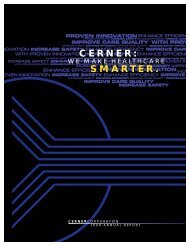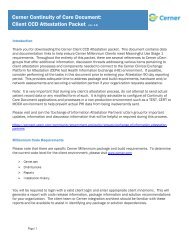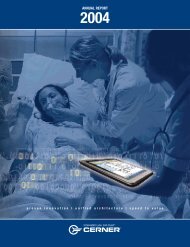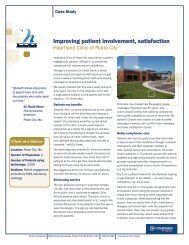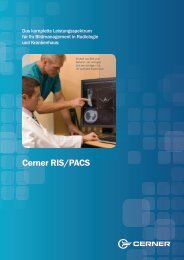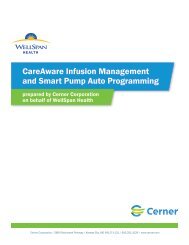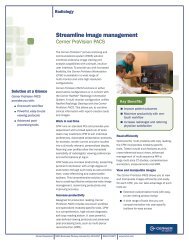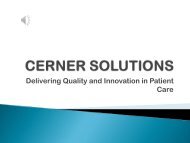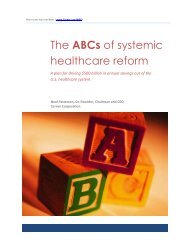The ABCs of systemic healthcare reform - Cerner Corporation
The ABCs of systemic healthcare reform - Cerner Corporation
The ABCs of systemic healthcare reform - Cerner Corporation
- No tags were found...
You also want an ePaper? Increase the reach of your titles
YUMPU automatically turns print PDFs into web optimized ePapers that Google loves.
Substantially all <strong>of</strong> the Company’s clients are integrated delivery networks, physicians, hospitals and other <strong>healthcare</strong> related<br />
organizations. If significant adverse macro-economic factors were to impact these organizations it could materially adversely<br />
affect the Company. <strong>The</strong> Company’s access to certain s<strong>of</strong>tware and hardware components is dependent upon single and sole<br />
source suppliers. <strong>The</strong> inability <strong>of</strong> any supplier to fulfill supply requirements <strong>of</strong> the Company could affect future results.<br />
During the second quarter, Fujitsu Services Limited’s contract as the prime contractor in the National Health Service (NHS)<br />
initiative to automate clinical processes and digitize medical records in the Southern region <strong>of</strong> England was terminated. This<br />
had the effect <strong>of</strong> automatically terminating the Company’s subcontract for the project. At January 3, 2009, more than ten<br />
percent <strong>of</strong> total net receivables represent accounts receivable and contracts receivable related to that subcontract. <strong>The</strong><br />
Company and Fujitsu are in dispute regarding the receivables and are working to resolve these issues based on processes<br />
provided for in the contract. While uncertainties exist related to the ultimate collectability <strong>of</strong> the receivables, management<br />
believes that it has valid and equitable grounds for recovery <strong>of</strong> such amounts and that collection <strong>of</strong> recorded amounts are<br />
probable.<br />
(q) Accounting for Share-based payments<br />
<strong>The</strong> Company follows SFAS No. 123(R), “Share-Based Payments” to account for share-based awards. SFAS No. 123R<br />
addresses the accounting for share-based payment transactions with employees and other third parties and requires that the<br />
compensation costs relating to such transactions be recognized in the consolidated statement <strong>of</strong> earnings. Refer to Note (9) for<br />
a detailed discussion <strong>of</strong> share-based payments.<br />
(r) Reclassifications<br />
Certain prior year amounts in our consolidated financial statements have been reclassified to conform to the current year<br />
presentation.<br />
(s) Derivative Instruments and Hedging Activities<br />
<strong>The</strong> Company follows Statement <strong>of</strong> Financial Accounting Standards No. 133 (SFAS 133), “Accounting for Derivative Investments<br />
and Hedging Activities,” as amended, to account for its derivative and hedging activities.<br />
<strong>The</strong> Company has issued foreign-denominated debt to manage its foreign currency exposure related to its net investment in its<br />
subsidiary in England. Beginning in 2006, at the beginning <strong>of</strong> each quarterly period, the Company designated a portion<br />
(between £60 million and £63 million during the year) <strong>of</strong> its debt (£65 million), which is denominated in Great Britain Pounds, to<br />
hedge its net investment in a subsidiary in England. During 2007 and 2008 the Company designated all £65 million <strong>of</strong> its debt<br />
that is denominated in Great Britain Pounds. For the year ended January 3, 2009, approximately $22 million, net <strong>of</strong><br />
approximately $13 million <strong>of</strong> tax, <strong>of</strong> decreases in the debt related to changes in the foreign currency exchange rate were<br />
included in accumulated other comprehensive income. For the year ended December 29, 2007 approximately $1.5 million, net<br />
<strong>of</strong> approximately $1 million <strong>of</strong> tax, <strong>of</strong> increases in the debt related to changes in the foreign currency exchange rate were<br />
included in accumulated other comprehensive income.<br />
(t) Recent Accounting Pronouncements<br />
In September 2006, the Financial Accounting Standards Board (FASB) issued Statement <strong>of</strong> Financial Accounting Standards No.<br />
157 (SFAS 157), "Fair Value Measurements." This statement establishes a single authoritative definition <strong>of</strong> fair value when<br />
accounting rules require the use <strong>of</strong> fair value, sets out a framework for measuring fair value and requires additional disclosures<br />
about fair value measurements. On February 12, 2008, the FASB issued FASB Staff Position (FSP) No. FAS 157-2. This FSP<br />
defers the effective date <strong>of</strong> SFAS 157 to fiscal years beginning after November 15, 2008 for nonfinancial assets and liabilities<br />
within the scope <strong>of</strong> the FSP. <strong>The</strong> Company adopted SFAS 157 for fair value measurement outside <strong>of</strong> the scope <strong>of</strong> FSP No. FAS<br />
157-2 on December 30, 2007. On October 10, 2008, the FASB issued FSP No. FAS 157-3 that clarifies the application <strong>of</strong> SFAS<br />
157 in a market that is not active. FSP No. FAS 157-3 is effective for all periods presented in accordance with SFAS 157 and<br />
the Company has considered the guidance with respect to the valuation <strong>of</strong> its financial assets and their designation within the<br />
fair value hierarchy. <strong>The</strong> Company was required to fully adopt SFAS 157 as <strong>of</strong> the first day <strong>of</strong> the 2009 fiscal year and does not<br />
expect its adoption to have a material impact on the Company’s consolidated financial statements.<br />
In December 2007, the FASB issued Statement <strong>of</strong> Financial Accounting Standards No. 141 (revised 2007), Business<br />
Combinations (SFAS 141(R)) which replaces SFAS 141 and supersedes FIN 4, “Applicability <strong>of</strong> FASB Statement No. 2 to<br />
Business Combinations Accounted for by the Purchase Method”. SFAS 141(R) establishes guidelines for how an acquirer<br />
measures and recognizes the identifiable assets, goodwill, noncontrolling interest, and liabilities assumed in a business<br />
combination. Additionally, SFAS 141(R) outlines the disclosures necessary to allow financial statement users to assess the<br />
impact <strong>of</strong> the acquisition. <strong>The</strong> Company is currently assessing the impact <strong>of</strong> adoption <strong>of</strong> SFAS 141(R), which will depend on<br />
future acquisition activity, and will be required to adopt SFAS 141(R) prospectively for business combinations occurring on or<br />
after the first day <strong>of</strong> the 2009 fiscal year.<br />
Also in December 2007, the FASB issued Statement <strong>of</strong> Financial Accounting Standards No. 160 (SFAS 160), “Noncontrolling<br />
Interests in Consolidated Financial Statements”, which amends ARB No. 51. SFAS 160 guides that a noncontrolling interest in<br />
a subsidiary should be reported as equity in the consolidated financial statements, and that net income should be reported at<br />
68



